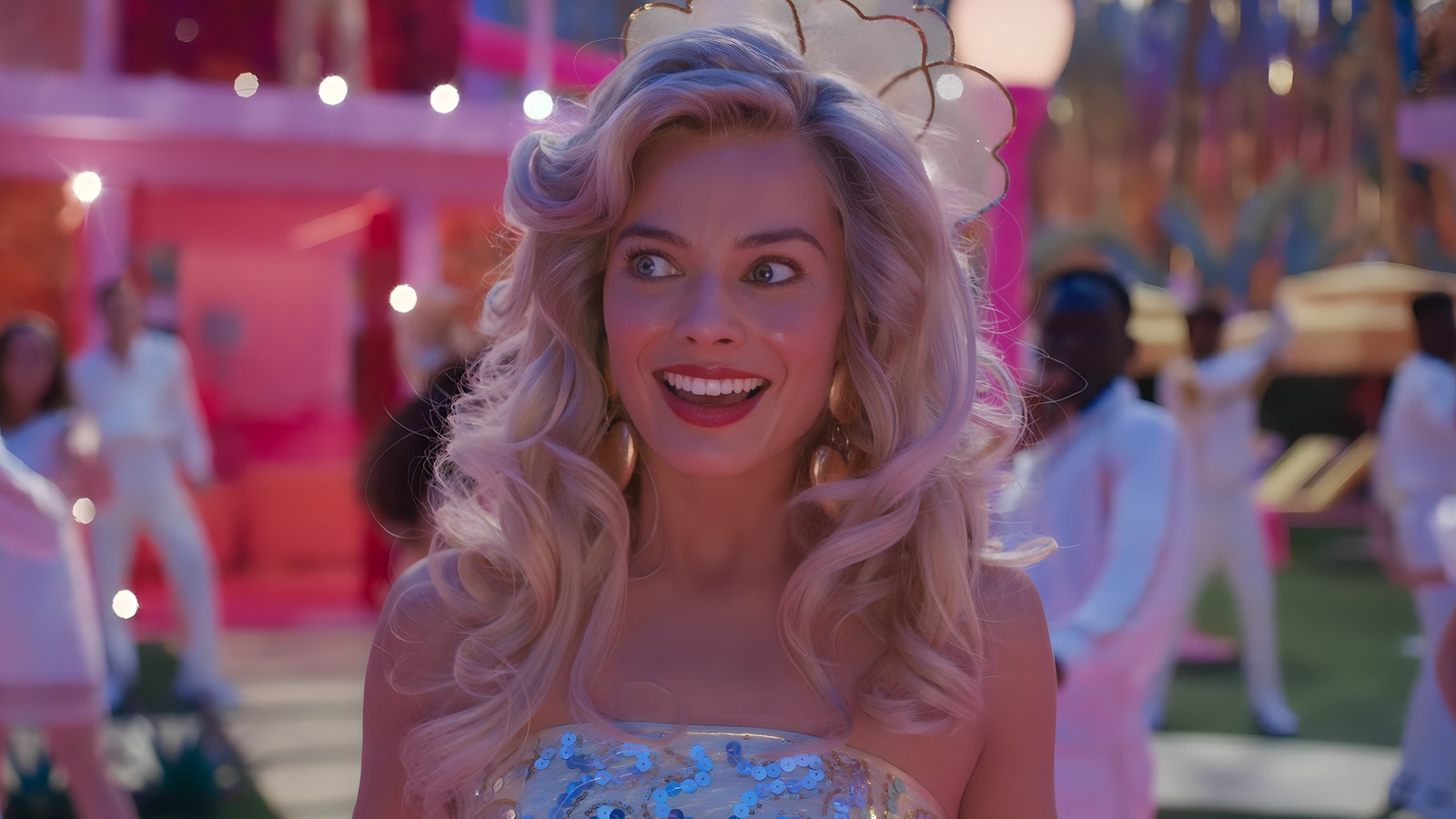
How Barbie’s Cutting Satire & Loving Fan-Service Prove Cash-Ins Can Be Clever – Looper
Contains spoilers for “Barbie”
Ask most cinephiles which movie based on a toy line ultimately surpassed their expectations, and they’ll almost definitely bring up “The Lego Movie.” Released in 2014, Phil Lord and Chris Miller’s irreverent, stylized, and extraordinarily funny movie sets up an entire premise wherein Emmet (voiced by Chris Pratt), an otherwise unremarkable Lego man, is told he’s “the Special,” only for that to all unravel when it turns out he’s just a guy. For years, “The Lego Movie” has been the gold standard for movies that do more than you’d expect while telling the story of a corporate-built pre-existing intellectual property. Enter the “Barbie” movie.
Greta Gerwig’s post-modern masterpiece is, yes, based on the titular doll made by Mattel —and yes, Mattel probably stands to make quite a lot of money off of this entire situation. That is what it is; we live in a capitalist world and Barbie’s a big part of that, without question. In this movie, though, Gerwig pulls off a brilliant hat trick on a few different levels — she gives Barbie (Margot Robbie) unexpected depth, lets another character steal the show, and treats Barbie’s legacy with love while simultaneously tearing it down. “Barbie” is this decade’s “Lego Movie,” and just like its predecessor, it proves that corporate “cash-ins” don’t have to be meritless.
Barbie’s about a toy — but it’s about so much more
 Warner Bros./YouTube
Warner Bros./YouTube
If you were paying attention to the dreaded “discourse” when “The Social Network” came out in 2010, you might recall that it was dismissively referred to as “the Facebook movie” before it blew audiences away upon its release. “Barbie” had similar detractors, but those familiar with Gerwig’s work knew otherwise; the writer-direc tor has been working alongside “Barbie” co-writer Baumbach for years, crafting intimate personal stories like “Frances Ha,” and her two solo directing credits besides “Barbie” — “Lady Bird” and “Little Women” — received overwhelming acclaim. Gerwig is an incredibly smart filmmaker, and when she started the press tour for “Barbie” and revealed that her influences included everything from “The Red Shoes” to “The Umbrellas of Cherbourg,” people knew to expect more than “a movie about Barbie dolls.”
Gerwig, put simply, delivered. “Barbie” is so much more than “a movie about a toy” — it’s a searing statement about the ways women are diminished in a patriarchal society and world, and it also posits that feminism is actually good for both men and women (but more on that second point later). In Gerwig’s hands, “Barbie” is about existential crises, what it feels like to grow up and lose your childlike innocence, and the ways that gender roles can be incredibly damaging when people are forced into boxes (a concept “Barbie,” naturally, takes literally). This isn’t a movie about a toy. It’s a movie about the world we live in, and the ways in which it could be better.
Greta Gerwig tells Barbie’s story, but also skewers the doll’s legacy
 Warner Bros./YouTube
Warner Bros./YouTube
Gerwig, who has said in recent interviews that she played with her Barbie dolls well into his teenage years, clearly has a complicated relationship with the concept of Barbie — as so many women do. As a result, “Barbie” is at once a love letter to the iconic doll and a scathing condemnation of her impossible blonde perfection. This is a movie where a teenager bluntly insults Barbie to her face, calling her a “fascist” and making her cry. (Poor Barbie is baffled by this particular term, claiming that she couldn’t be a fascist because she doesn’t control the railways or the flow of commerce.)
“Barbie” isn’t easy on its leading lady. It plainly lays out that Robbie’s Barbie is blithely unaware of actual inequality in the “Real World” as compared to the idyllic “Barbie Land,” a full matriarchy where everything is perfect all the time always. That said, it shows us Barbie’s imperfections by doing something truly radical: transforming Barbie from an idealistic doll into a clear-eyed human. Barbie’s downfall starts when she starts thinking about death and developing cellulite; you know, normal things that happen to human women. “Barbie” isn’t completely mean to Barbie, but it manages to make her whole by revealing her flaws, and Gerwig manages to do that in a loving way by ultimately letting her join the human race and imagine things, rather than simply being an “idea.”
Barbie’s best misdirect is actually Ken
 Warner Bros./YouTube
Warner Bros./YouTube
There are many brilliant things about the “Barbie” movie, and one of them is, without question, Ken. Played to perfection by Ryan Gosling, Ken starts the narrative as Barbie’s emotional support animal, for all intents and purposes, but when he joins her in the real world, he realizes that over there, men run things — not women. Ken, unsurprisingly, loves this. After grabbing books from a school library that focus on everything from trucks to horses to the patriarchy, Ken returns to Barbie Land without Barbie and transforms the landscape, brainwashing the Barbies alongside the other Kens and forming a new government called the “Kendom.” (It involves a lot of video screens playing footage of horses on a loop, and a bunch of mini-fridges stocked with what the Kens call “brewski beers.”)
The Barbies ultimately return Barbie Land to its rightful state, but in the process, Ken admits something crucial to Barbie: he didn’t really like Kendom all that much. (In one of the movie’s best lines, Ken tells Barbie that when he realized patriarchy didn’t have as much to do with horses as he hoped, he basically lost interest.) What Gerwig does, through Ken’s character, is make it clear that the patriarchy isn’t good for the Kens either. Ken and Barbie need to be on a slightly more equal footing, a conclusion Barbie eventually reaches by the end of the movie. As she admits, not every night “needs” to be girl’s night, but there can be balance while the matriarchy remains.
Barbie is great — copies of it might not fare quite as well

“Barbie” is a smart, insightful, intricately crafted movie made by one of the most audacious and creative directors working today — and the idea that this standard would hold true for every single Mattel project to come is as naive as Barbie is about the state of the real world as the movie begins. Sure, Daniel Kaluuya’s apparently super-dark, “surrealistic” take on “Barney” sounds interesting and could be just as clever as “Barbie,” but let’s all try and be realistic. Mattel has an enormous slate of incoming projects, with everything from “Hot Wheels” to “Uno” on the docket. How could lightning possibly strike that many times?
Gerwig’s personal connection to the mythos of Barbie mixed with her sharp talents as a screenwriter and director are the keys to this movie’s success. Not every Mattel project will get this lucky, and that’s not conjecture — it’s a fact. Creators like Gerwig don’t grow on trees, as much as Mattel executives probably wish that they did… and every piece of the “Barbie” movie comes together because its writer-director understands Barbie as an image, a character, a toy, and ultimately, the human being she becomes.
We’re not going to get a whole slew of “Barbie” movies just because Gerwig kicked off Mattel’s movie spree at such a high level. That said, we can only hope that, as directors look to Gerwig’s example for their own takes on Mattel’s toys, they’ll at least be able to approximate her talents in some way, shape, or form. It’s that, or we get fewer movies like “Barbie” and a lot more like “The Emoji Movie.”









![[VIDEO] Gelagat Che Ta Tunggu Aaisyah Bersiap Cetus Perhatian Ramai!-“Tengok Penampilan, Tercampaklah Mak Hang!” [VIDEO] Gelagat Che Ta Tunggu Aaisyah Bersiap Cetus Perhatian Ramai!-“Tengok Penampilan, Tercampaklah Mak Hang!”](https://i0.wp.com/murai.my/wp-content/uploads/2024/04/25DCA8CF-C629-4DCA-8597-2CA8819D9297.jpg?resize=150%2C150&ssl=1)














![[VIDEO] Reaksi Tunku Azizah Sambut Birthday Anakanda Tengku Puteri Jihan, Raih Perhatian Ramai! [VIDEO] Reaksi Tunku Azizah Sambut Birthday Anakanda Tengku Puteri Jihan, Raih Perhatian Ramai!](https://i0.wp.com/murai.my/wp-content/uploads/2024/04/Untitled-design-27.jpg?fit=300%2C300&ssl=1)










![[VIDEO] Nadhir Nasar Sambut Birthday Tengku Ameera Cetus Perhatian Ramai”- Nak Kena Bersaing Dengan Kerabat Pulak, Hmm” [VIDEO] Nadhir Nasar Sambut Birthday Tengku Ameera Cetus Perhatian Ramai”- Nak Kena Bersaing Dengan Kerabat Pulak, Hmm”](https://i0.wp.com/murai.my/wp-content/uploads/2024/04/D3415DF6-2464-4794-880F-841EB898C969.jpg?w=768&ssl=1)


































